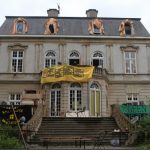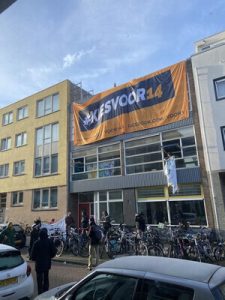 A number of Rotterdammers have squatted a building in Delfshaven. They want to make a statement to the city council. Rotterdam has been pushing people on the minimum wage out of the city for years. The activists are now drawing a line and want a higher minimum wage and affordable housing.
A number of Rotterdammers have squatted a building in Delfshaven. They want to make a statement to the city council. Rotterdam has been pushing people on the minimum wage out of the city for years. The activists are now drawing a line and want a higher minimum wage and affordable housing.
Inequality in Rotterdam is becoming more and more visible. Everywhere in the city, social housing is poorly maintained and demolished to make way for expensive housing. Rents continue to rise in our city and the income of Rotterdammers with a minimum wage or a benefit is lagging behind. There is also less and less room for their social activities and initiatives. They are being pushed out of our city. There seems to be no place for them anymore.
We do not accept this. That is why we support the Rotterdammers who have moved into the building at Havenstraat 231. They are claiming back a piece of Rotterdam to draw attention to the struggle of many Rotterdammers. Together with them we want the wealth and space in our city to be distributed more fairly. Only then can every Rotterdammer participate and have a place. This can be done by raising the minimum wage to 14 euros per hour in 2022 and by properly maintaining and renovating social housing.
Our city council did not want to listen before. Once again we call on them to ensure that every Rotterdammer can live affordably and have a decent income. We call on the City of Rotterdam to choose for us.
We want a thriving, colorful city in which everyone can live and thrive instead of survive. [Read More]
Rotterdam: building squatted in Delfshaven
Amsterdam: Public announcement of the occupation of Afrin squat
Since the 29th of December 2020, the anarchist organisation for reconstruction of militant proletariat occupied a building in Amsterdam. (the address of the squat will be announced together with the call for an open assembly inside the squat).
Aims and principles & Points of Unity of Afrin Squat Assembly:
All the problems we face today are caused by- and made worse by the existence of the state and capitalism, which serves and protects the interests of the ruling class and the bourgeoisie. While the rich benefit of disaster capitalism and get even richer of the crises, the proletariat has to bare the burden of the crisis and pay for the bailouts of the rich. The real virus is neo-liberalism and the dangerous pandemic is capitalism. We believe nothing is more important than for the struggle to continue, to be in class solidarity with each other and to self organise against all forms of exploitation and authority.
We believe in solidarity and the need for self-defence by any means necessary. Capitalisms needs crises and the state will always use these emergencies, whether it is imperialistic state war or a public health crisis, to increase their power and to suppress self organisation and resistance. The state is the one responsible for any death as a result of the pandemic, as the public health system is gutted, funding for imperialist wars and the military is still increasing.
As long as the state and capitalism exist, safety only exist for the rich and for fascists, and such a word as safety does not have any practical meaning to the oppressed. Social control and suppression created by the state during the pandemic tries to criminalise any type of class solidarity and resistance against the state and capitalism. The social problems such as homelessness, unemployment, poverty and the horrible conditions of immigrants locked up in concentration camps (AZC) are only made worse in these times.
[Read More]
Wassenaar: Bats at Ivicke
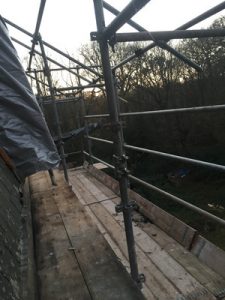 Potential Roost Destroyed And Building In Danger After Municipality Of Wassenaar Ignores Directive To Stop All Works.
Potential Roost Destroyed And Building In Danger After Municipality Of Wassenaar Ignores Directive To Stop All Works.
The municipality of Wassenaar removed Ivicke’s gutter despite an Omgevingsdienst Zuid-Holland directive to stop all works on the building immediately due to the suspected presence of bats. The removal of the gutter also did not accord with the municipality’s own work plan, meaning Ivicke is now at serious risk of water damage.
On Tuesday 24 November, Omgevingsdienst (OD) Zuid-Holland ordered the municipality of Wassenaar to stop the works on Ivicke because of the strong possibility of bats roosting in and around the building. The municipality hasn’t conducted any assessment on this, or sought permits for the work in general, even though this is precisely why the owner, Ronnie van de Putte, was prevented from carrying out works on the building several months ago. The workers left the site early on Tuesday 24 and weren’t here on Wednesday 25, pending the results of the OD’s investigation.
(At this stage of the municipality’s works (4 weeks in), there’s scaffolding all around the building, more or less at the height of the now-removed gutter, but it’s not yet fully erect. Before the works stopped, the scaffolding was due to be completed by November 30, according to the plan submitted to us by the architect of the project.) [Read More]
Amsterdam: Het Schip, Queer Feminist Squat opened
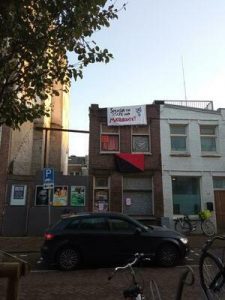 About two weeks ago a house in de Kinkerbuurt was re-squatted. The building was left empty for over a year after the previous occupiers were asked to leave, as supposedly it was to be demolished and replaced with four luxury apartments. The resquatting was done silently and after a few days the cops recognised the occupiers domestic peace. (It’s the 3rd time within 5 years Jan Hanzenstraat 115 is squatted).
About two weeks ago a house in de Kinkerbuurt was re-squatted. The building was left empty for over a year after the previous occupiers were asked to leave, as supposedly it was to be demolished and replaced with four luxury apartments. The resquatting was done silently and after a few days the cops recognised the occupiers domestic peace. (It’s the 3rd time within 5 years Jan Hanzenstraat 115 is squatted).
A message from the occupiers:
We are against the state, patriarchy, police violence, capitalism and all forms of hierarchy and oppression. We will defend ourselves, and our right to exist and live the way we want. Gentrification is a direct attack on our communities, our livelihood and our freedom to be in the city. We are queer, feminist, antifascist and we are tired of this shit. Our free spaces are under attack everywhere and we will not stand by quietly watching their destruction. The time to occupy, resist and strike is now. The pandemic has had a disproportionately negative effect on working class people, womxn, Queer and BAME folks and other marginalised groups. We will not let ourselves be the collateral damage of this crisis. We take care of us. We stand in solidarity with womxn and queer people everywhere, fighting capitalism and patriarchy. Solidarity to our neighbours from Liebig 34. Our movement is international, it cannot be evicted by the state or contained within national borders. [Read More]
Wassenaar: Municipality Wants To Ivickt Us Without A Court Hearing Or A Plan
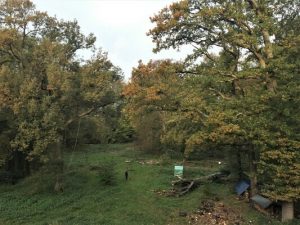 The mayor and executive board (B&W) of Wassenaar rejected our request to suspend our eviction from Ivicke until at least six weeks after a court has ruled on the case.
The mayor and executive board (B&W) of Wassenaar rejected our request to suspend our eviction from Ivicke until at least six weeks after a court has ruled on the case.
After almost two and a half years of our residency at Ivicke during which we have cooperated to ensure the municipality can start essential repairs to the building, the B&W demands we leave without exercising our right to represent our interests in front of a judge, nor with a plan in place for Ivicke’s future use. The B&W says a postponement would neither serve the interests of the owner or the public, though it offers no explanation behind this assertion nor an opinion on our interests as Ivicke’s current residents.
Let’s be clear. The B&W’s eviction order has nothing to do with Ivicke’s repair works. At least, legally speaking. The municipality’s contractors are currently preparing the terrain. Our presence here doesn’t prevent the works from happening. [Read More]
Netherlands: Actions against the ban on squatting
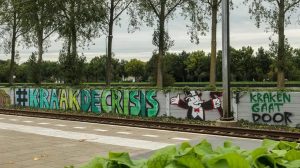 This year, October 1st marks the ten year anniversary of the Squatting Ban coming into effect in the Netherlands.
This year, October 1st marks the ten year anniversary of the Squatting Ban coming into effect in the Netherlands.
Much like what we saw in the UK following the criminalisation of squatting in 2012, the repercussions have been drastic for our community and our movement. We’ve been pushed out of city centres, drastically reducing our visibility and contact with the public outside our own community. The number of squats across the country has been divided by ten, and the legal risks surrounding squatting have risen. Perhaps most damaging of all, our community is sorely lacking in participation from a “new generation”. A large number of people in that age group are totally oblivious to the concept of squatting.
Since the squatting ban came into effect, homelessness has doubled. Simultaneously, waiting lists for social housing have grown enormously, the average waiting time being nine years. The total lack of affordable housing constitutes a housing crisis which, since 2020, is being referred to as a housing emergency. [Read More]
Netherlands: Actions after 10 years of squatting ban
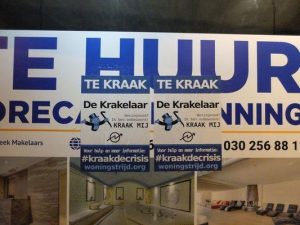 10 Years On! And you still can’t live in a waiting list!
10 Years On! And you still can’t live in a waiting list!
Today, October 1st, 2020 marks the 10 year anniversary of the criminalisation of squatting in the Netherlands through the Kraken en Leegstand (Squatting & Emptiness) law.
Despite the law, kraken gaat door (squatting continues).
On the face of it, the law was created to end both squatting and emptiness. It has done neither. Buildings are still empty and for many people squatting remains a necessity. After all, it is not the existence of empty buildings that leads to squatting, but rather the lack of accessible housing.
Whether you are squatting, renting, or looking to buy a home, finding an available (let alone affordable) house is a struggle. [Read More]
Wassenaar: Villa Ivicke, news from the last six months
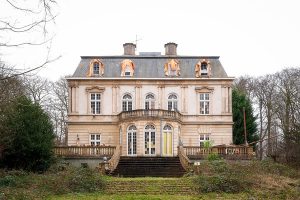 Zoning plan, construction works, court proceedings.
Zoning plan, construction works, court proceedings.
A lot has happened in the past six months. In April, the owner started a lawsuit to evict us. And in May, the municipality of Wassenaar imposed an administrative order on both the owner Ronnie van de Putte and us as residents. With this administrative order, the municipality wants to put pressure on the owner to carry out construction works, and on us to leave the building; the latter on the grounds that Ivicke’s zoning plan is not “housing” but “office”.
As the residents of Ivicke, we have filed an appeal against the enforcement of the zoning plan, the hearing was supposed to take place on the 16th of September. However, the case was referred to court, wherefore the hearing was cancelled. We are now waiting for a date for this hearing. In the administrative order, the municipality has marked November 19 as our leaving date. Be that as it may, it is already clear that there won’t be a ruling in this case before said date, but this doesn’t mean that the municipality cannot evict us. For this reason, we have submitted a request to the municipality to suspend the enforcement of the administrative order until the court has ruled whether such enforcement is lawful. [Read More]
Wassenaar: The Danger of Occupied Ivicke
Why does the municipality of Wassenaar consider our residency at Ivicke to be a “danger”? And what exactly are we endangering? Here, I will give these questions some space, that necessarily lead us back in time.
In January 2019, Ivicke’s owner requested the municipality to enforce the bestemmingsplan (zoning plan), which was rejected a few months later in June. The municipality justified this decision by pointing out that our eviction would constitute a danger to public order given the owner’s lack of a plan for the building – that is, more vacancy could lead to a second act of squatting.
[Sidenote: The notorious bestemmingsplan is the bureaucratic destiny of Ivicke which was changed to an office function in the 1980s from its original purpose as residency. Thereafter, antisquat companies, hired by the current owner, made use of some rooms, which moves in a legal grey area but is tolerated due to its corporate nature and temporary status. While our residency is quite certainly of a temporary nature as well, the bestemmingsplan has been used as a strategy to evict the “danger” we pose by both the owner and the municipality.]
Back in time: The owner’s lawyer appealed on 29th of July, which was received on the 31st of July by the municipality – interesting timing, as the mayor got to know about the upcoming No Border Camp (NBC: 01.08.-04.08.) on the 30th of July. The NBC is an international gathering with workshops and actions, that inform about and act against the inhumane migratory policies of EU-states, and that aim to connect struggles in other parts of the world. Here, we pause in time because those days were packed with legal procedures and political struggles.
After the owner’s lawyer was informed about our plans with the terrain, she took the municipality to court in order to force them to prohibit the upcoming camp. When the judge didn’t grant her will, she went in appeal hoping that another judge would forbid the – at that point – ongoing camp. Luckily, this didn’t happen and the NBC proceeded. It is however interesting to investigate the lawyer’s justification for this legal upheaval. Her main argument emphasised the potential harm that the activities during the camp could cause to the monument. Her concern is quite ridiculous, as she is representing the person – Ronnie van de Putte – that has remorselessly observed the gradual degradation of the monument and not taken any steps to prevent its eventual destruction.
[Read More]
Amsterdam: Keizersgracht 318 resquatted
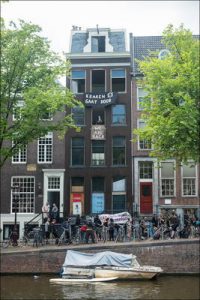 Since thursday (july 9th) a building was squatted in Amsterdam, on the Keizersgracht number 318. This sunday afternoon the squatters made their presence known. A statement from the squatters:
Since thursday (july 9th) a building was squatted in Amsterdam, on the Keizersgracht number 318. This sunday afternoon the squatters made their presence known. A statement from the squatters:
Since some time we are living in the building at the Keizersgracht number 318. Today we make our presence known. The building has been vacant for years. In 2015 it was also squatted. Back then it got evicted pretty quickly, because the owner claimed to still use it. Looking at the state of the building, that wasn’t very apparent. Later, in 2017, the owner got caught illegally demolishing the monumental interior of this building. The municipality decided to put a building stop on the building. It was prohibited for the owner to do anything else with the building, before the monumental interior was rebuild to its original state.
Now, 3 years later, nothing has changed. The building is still empty, nothing has been restored, and the decay continues.
All this while the homelessness numbers in Amsterdam are rising, the rents are skyrocketing, the waiting lists for social rent are getting close to 20 years and hotel after hotel is being build.
For us, reason enough to start using this building, we want to have a house! [Read More]
The Hague: Housing Action Days, call for participation!
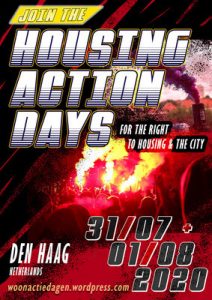 On Friday and Saturday 31st of July and 1st of August, Housing Action Days will take place in The Hague. The theme for Friday is social housing and precarious modes of housing, and the theme for Saturday is the selling out of the city and gentrification. During these two days we will make a collective fist against precarity and the housing shortage.
On Friday and Saturday 31st of July and 1st of August, Housing Action Days will take place in The Hague. The theme for Friday is social housing and precarious modes of housing, and the theme for Saturday is the selling out of the city and gentrification. During these two days we will make a collective fist against precarity and the housing shortage.
In the past couple of years the city has become the stage of a social struggle. Capital is increasingly controlling housing and public spaces. The city is transformed into a revenue model, a new apparatus for a select group to accumulate wealth. This has drastic consequences for many of us. De waiting lists for social housing are ever lengthening, rents are already way too expensive and the political unwillingness to take up these issues is stifling. In the inner city, one loft gets restored after another and only expensive private sector housing is built. Hip coffeehouses and their terraces are spreading like an oil spill. We don’t want a city merely for consumption but a city in which we can live!
Paired with the gentrification, the state’s net to control public spaces tightens. Concurrently to being forced to pay increasingly high rent for increasingly small spaces, we are being dispossessed of the streets: hanging out in the street is perceived as suspicious and will get you castigated for gathering. The only places where you can still gather in public are parks or sports field – but never without the supervision of cameras. Our living spaces are shrinking, we will no longer put up with this shit anymore! [Read More]
Amsterdam: Always Anti-Anti-kraak
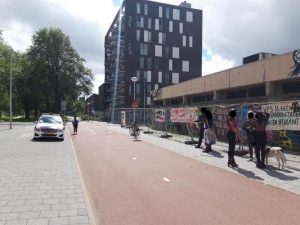 Sunday afternoon there was a small action at a former squat in Amsterdam Noord. The squatters are angry, because in the evicted building is now an anti squat workspace. The building, that had been squatted already for 3 times, got evicted last summer. It turns out it got evicted for anti-squat. Below a statement of the squatters:
Sunday afternoon there was a small action at a former squat in Amsterdam Noord. The squatters are angry, because in the evicted building is now an anti squat workspace. The building, that had been squatted already for 3 times, got evicted last summer. It turns out it got evicted for anti-squat. Below a statement of the squatters:
Today we are here to put the situation surrounding the building in the middle of your neighborhood under attention. The old pizzeria on Statenjachtstraat 598. Probably the recent history of this building is still known to you, but to summarize:
After years of vacancy, last year the building got bought by to rich real estate dealers, Axel Veldboom and Frans Blom. Last summer, the place got resquatted (it was already squatted 2 times before). It was clear for the squatters that there were no short term plans for the building. But the owners did have a plan. A pretty ambitious and unrealistic plan, to build an enormous building in the middle of the neigbourhood.
The state decided to start a procedure to evict the squatters, squatting is forbidden, and the owner claims to have a plan. The squatters decided to fight the state in court, to prevent the eviction. In a court case like this the importance of interests is being weighed against each other by a judge, or at least it should be. On one side the needs of the state for having the place evicted, and on the other side the needs of the squatters, to be able to have a place to live. [Read More]
